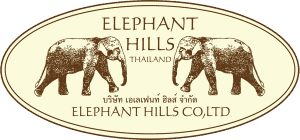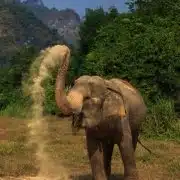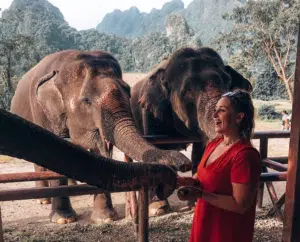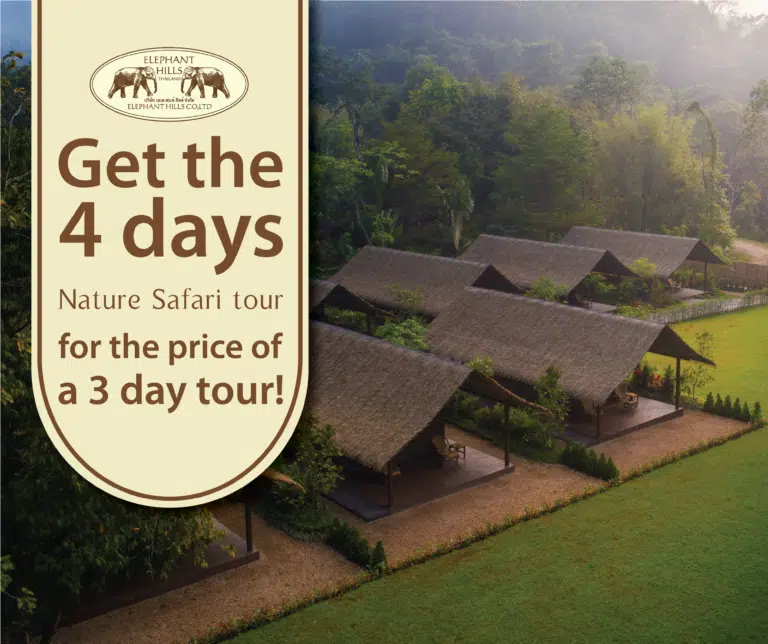Leading the Eco-Tourism Revolution at Elephant Hills

Are you dreaming of escaping the hustle and bustle of modern life and discovering an exhilarating visit through the lush rainforests of Thailand? These natural wonders offer the chance to experience exotic wildlife, pristine beaches, and incredible cultural experiences, and here at Elephant Hills, sustainability is our key driving force.
Eco-tourism in Thailand is on the rise as globetrotters seek meaningful experiences that positively impact the world around them, and we’re leading the charge towards a greener and more responsible future.
Why is sustainable travel so important, though, and how is Elephant Hills contributing to preserving Thailand’s natural heritage? We thought we would take a closer look…
Why does sustainable travel matter?

Before we explore Elephant Hills’ sustainability efforts and green travel in Thailand, it’s first important to understand why sustainable travel is so important for the country.
One of the most significant benefits that eco-tourism provides is the preservation of Thailand’s natural resources. The breathtaking beaches and lush jungles have long been a major draw for visitors; however, unchecked tourism can lead to degradation through pollution and overexploitation. Sustainable travel in Thailand helps to minimise these negative impacts, ensuring that the natural beauty can be enjoyed for future generations.
Of course, it’s not just about protecting the stunning views. Thailand is home to a rich array of plant and animal species, many of which are endangered or at risk due to habitat loss and illegal trade. Eco-friendly travel options help to support conversation efforts, like those at Elephant Hills, to protect biodiversity and preserve these delicate ecosystems.
Sustainable travel in Thailand also helps to empower local communities. Not only does it create economic opportunities for residents, but it also promotes and maintains their cultural heritage and traditions.
How Elephant Hills is supporting a greener future
At Elephant Hills, we are dedicated to ensuring we leave a better world for future generations, and sustainability plays a vital role in everything we do. As Thailand’s first luxury-tented jungle camp, we offer a stunning retreat for guests to discover the natural beauty of the Khao Sok National Park.
We are extremely lucky to be based in one of the most beautiful landscapes in the world, and being close to nature pushes us on to ensure we minimise the impact we have on the planet. To do this, we are involved in a number of key projects:
Sustainability

Sustainability is very important for everyone at Elephant Hills, and we hope to inspire our guests and other organisations to join us in being more environmentally conscious. We work with the local community as much as possible, providing economic opportunities and education on green practices. For the last 15 years, we have been working closely with local schools, helping to raise awareness of nature conservation and the dangers posed by deforestation. Our annual “Trees Can Talk” contest encourages children to think about the importance of protecting the ecosystem that surrounds them.
We also regularly host clean-ups of the Sok River, inviting the local community to come and join us. We run tree-planting sessions and other activities to offset our carbon footprint, with local residents and schools regularly supporting us on these trips and since 2017, we have planted thousands of trees in the Kaeng Krung National Park.
It’s not just about the local community, either. We believe in sustainable travel in Thailand and our guests play a big role in our sustainability efforts. All of them are provided with reusable stainless steel water bottles to fill up at our complimentary water taps, removing the need for plastic water bottles and we only utilise reusable stainless steel straws at our restaurants and cafes. Eco-friendly shampoo, conditioner and soap are provided in refillable ceramic dispensers, while all provided toiletries are made from sustainable materials.
We have even adapted our practices and marketing, with all events utilising reusable boxes, cups, utensils, and bottles. Our team uses seed pencils instead of plastic pens and has removed all plastic from our marketing materials, ensuring we minimise our impact at every step.
These practices have seen Elephant Hills achieve numerous awards for sustainable tourism over the years, but we know we can always do more. That is why we are continuously reviewing what we do and where we can improve.
Wildlife Monitoring
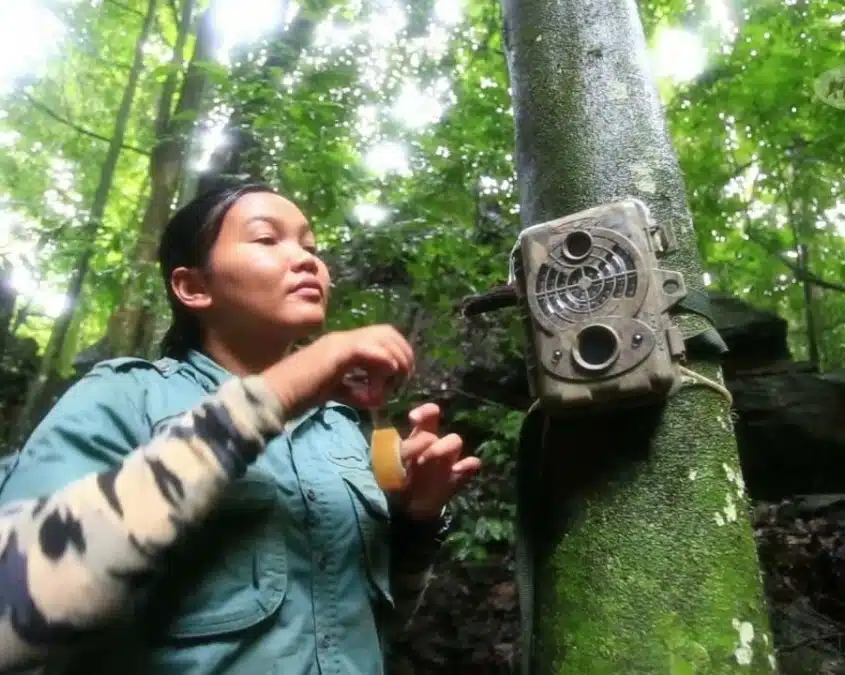
Another key area of focus for us is our wildlife monitoring. We began this project back in 2011, and it has continued to grow every year. These motion-triggered cameras provide exceptional insight and rare glimpses into the various species that call the jungle home.
The footage is then shared with the Khlong Saeng Wildlife Sanctuary, Khlong Saeng Wildlife Research Station and Khao Sok National Park authorities, providing them with the knowledge needed for their conservation projects.
These cameras offer our guides unique insight into the local area, allowing them to pass this on to our guests so they understand more about the ecosystem they are staying in.
Elephant Conservation
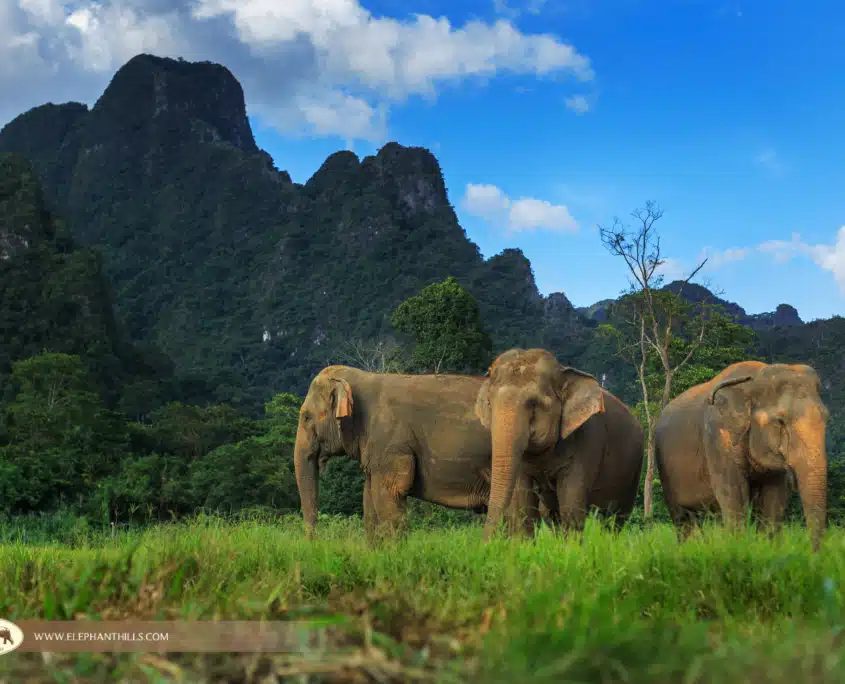
As our name suggests, we love the elephants that call the National Park their home and the welfare of these animals has always been our highest priority. Eco-tourism in Thailand means improving the conditions of elephant camps, and our Elephant Conservation Project aids the domestic and wild population through donations, research, workshops and training.
We also work to spread awareness of the endangered Asian Elephants, helping to prevent human-elephant conflicts by planting trees, installing electric fences, preparing salt licks, and providing essential equipment to rangers. We also regularly donate medical equipment, herbs, food, and other items to government-run elephant hospitals across Thailand.
Children’s Project

As a green travel business operating within the Khao Sok National Park, we’re committed to supporting the local community as much as possible. For us, ensuring the next generation understands the importance of conservation and sustainable practices is vital, which is why our Children’s Project is designed to support these youngsters.
For over 15 years, we have been working closely with schools across the region to improve facilities, supplying everything from books and stationery to playground equipment, musical instruments, and art supplies. Our work has even seen us coordinate the building of a library, renovating bathrooms and installing water filter systems.
We regularly invite local children to form part of our evening program for guests, with students performing traditional Thai dance. Not only does this help the children maintain local traditions, but it also gives them a chance to meet people from around the world and practice their English.
To strengthen our commitment to eco-tourism in Thailand, we ask our guests to consider supporting the project as part of their visit. Small donations of stationery, clothing, toys, and books can make a huge difference.
Sustainable Travel FAQs
- What is sustainable travel in Thailand?
Sustainable travel in Thailand is a growing movement from tourists looking to minimise their impact on the environment, reduce their waste, and support the local community. - Is Elephant Hills sustainable?
At Elephant Hills, sustainability is vital to our approach, and we are committed to ensuring we are offering eco-friendly solutions for our visitors. - How does sustainable travel benefit local communities in Thailand?
Sustainable travel benefits local communities in Thailand by creating economic opportunities through tourism, preserving cultural heritage, and supporting small-scale enterprises. - How is eco-tourism in Thailand different to traditional tourism?
While traditional tourism is focused primarily on profit, eco-tourism prioritises environmental conservation, community empowerment, and cultural preservation. - How can I be an ethical tourist in Thailand?
Working with sustainable organisations like Elephant Hills is vital. These not only support conservation efforts to maintain wildlife and native plants, but they also empower local residents.
Discover Thailand today!
Ready to discover Thailand’s lush rainforests and stunning beaches while helping to support the local communities? Elephant Hills is one of Thailand’s leading providers of sustainable travel and eco-tourism, offering a wide range of fantastic luxury tours that will allow you to experience the Khao Sok National Park in all its glory.
Want to learn more? Get in touch with our team who will be happy to help answer any questions you might have!
You might also like…
Thailand’s Cultural Gems: Unveiling Temples, Traditions & Thai Cuisine
Discover the Best of Southern Thailand: Your Guide to Phuket, Koh Samui, Krabi and Khao Lak
Khao Sok National Park – A Jungle Adventure In Southern Thailand
Honeymoon Destinations in Thailand
9 Stunning Examples of Beautiful Rainforest Animals
